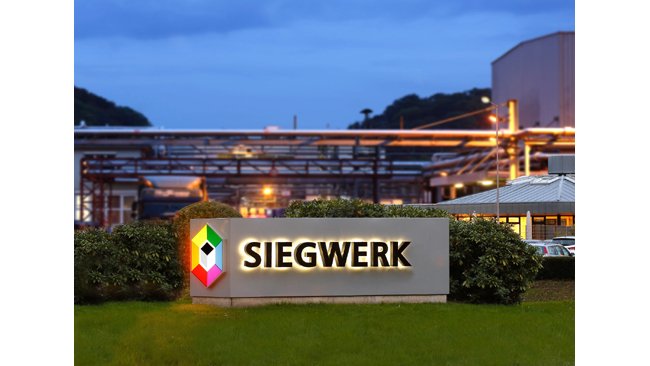
New Delhi,June 13, 2022.
Siegwerk,
one of the leading global providers of printing inks andcoatings for packaging
applications and labels, today announced its most recent development for
animproved deinking especially for rigid plastic packaging which is adding a
substantial value to industrialmechanicalrecycling.
Beside
the already existing water-based deinking primer (officially approved by The
Association of PlasticRecyclers (APR)) Siegwerk is now offering an UV-curing
deinking primer that is suitable for pressuresensitive and wrap around labels,
and shrink sleeves made of Polyolefin- and Polyester-based materials.This
development closes a gap as it now allows an inline printing of deinkable
materials in a 100% UV-Flexopress setup.
Today, consumers expect higher recycling
levels of plastic packaging where a meaningful reuse of
therecycledmaterialismandatoryinsteadofwastingthematerialintodowncyclingstreams.Thissustainability-conscious
demand has driven brand owners to rethink their packaging to switch to
100%recyclable packaging in the near future. “Achieving this 100% packaging
circularity requires a sufficientand consistent quality of recyclates,”
explains Ralf Leineweber, Head of Global Technology Developmentat Siegwerk.
In mechanical recycling as the today’s only established industrial recycling
process, deinkingof printed packaging material is one - if not the most -
viable technology to meet this requirement. Onlydeinking can bring here clean
and clear recyclates with a suitable quality back into the packaging streamto
consequently reduce the need of more virgin plastic material. “That’s why we
are committed to supportcustomers with innovative solutions facilitating
deinking and thus contribute to establish deinking asindustry standard further
improving packaging recyclability and circularity,” adds Guido Lander,
VicePresidentNarrowWebEMEAatSiegwerk.
To integrate deinking into the recycling
process, recyclers need to implement a hot washing step first, ifnot already
existing. Here, it is critical that the deinking does not negatively impact the
recycling processfor example by contaminating the wash water. Besides, the
lower the needed washing temperature fordeinking the better - because this not
only saves energy but also costs. More and more recyclers focusingon rigid
plastic packaging such as trays, cups and plastic containers are implementing
hot washingprocesses to improve the quality of their recyclates which enables
an easy and seamless integration of adeinking step for a broad range of
packaging materials. “We consider deinking primers as a key lever forsmart
deinking of crosslinked ink systems especially at low washing temperaturesfor
sleeves, labels andotherprinteddecorationforrigidplasticpackaging,”explains
Leineweber.
Siegwerk’s
deinking primers enable a smooth and reliable deinking at any hot washing
condition currentlyused in the recycling industry. They are compliant with
different film materials like cPET, PE or PP and donotrequire the
useofadedicatedink series tokeep complexity forusers ratherlow.Besides,any
printingprocess can be used in combination with our deinking primer portfolio –
from flexo, offset and screenprinting to foiling, metallic and other decorative
embellishments. With its UV-curing deinking primer, thecompany especially
offers a solution for converters who are using a pure UV flexo press and are
not ableto process a water-based primer. This primer shows best compatibility
with UV-curing inks facilitatingquantitative deinking according to the washing
protocols of EPBP and APR. Applied under bleedingresistant UV-cured ink layers,
the primer layer dissolves in the hot washing process and thus enables
thegenerationofhigh-qualitycolorlessrecyclates,whilethenon-bleedinginkformulationsensureacleanandreusablewashingsolution.
Siegwerk is currently engaged in various
deinking projects for all kind of rigid packaging solutions with
in-moldandpressuresensitivelabelsaswellasfordirectprintedrigidcontainers.“Thegreatestopportunities
to improve plastic recycling in line with a circular economy obviously lay in
areas where hotwashing already became a standard step within the recycling
process, such as in the PET bottle 2 bottlerecycling,” adds Ralf Leineweber.
Siegwerk has for example developed deinking technologies for shrinksleeves
allowing a 100% recyclability of bottle and sleeve in food contact grade
quality. Furthermore, theinkexpertseesexcellent
opportunitiestorecoverhigh-qualityrecyclatesfrompostindustrialflexiblepackaging
waste via deinking. Post-consumer waste is supposed to follow as well at a
certain time due toitsvolumerelatedimportance.
Next
to deinking primers, printing inks and coatings, Siegwerk also offers its
customers technical servicesalong the value chain to support an optimized and
consistent deinking process. The company can
alsoprovideoptimizeddeinkingchemistrybasedonasystematicdevelopmenttoensurefastdeinkingresulting
in clean flakes with almost virgin quality of the recyclate. “Deinking is
not a product for us, it is a“Full-Service Offering” where everything needs tie
together,” says Lander. “That’s why we follow a holisticapproach
and also offer the execution of deinking tests according to the most common
washing protocolsin our specialized laboratories.” Based on its deinking
expertise, Siegwerk can guide customers throughthe entire process, from the
unprinted substrate to the deinked and recycled packaging material,
finallyhelpingtooptimizeplasticpackagingrecyclinginlinewithacircular economy.